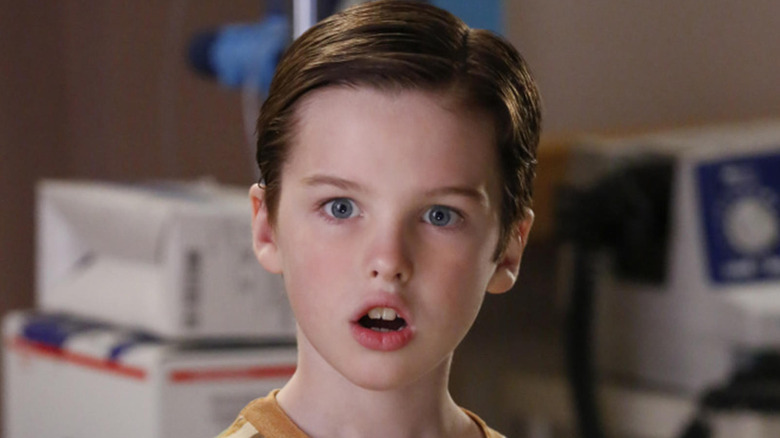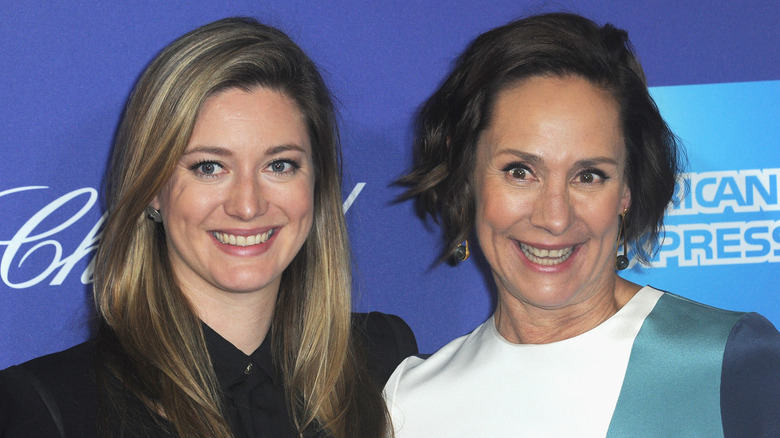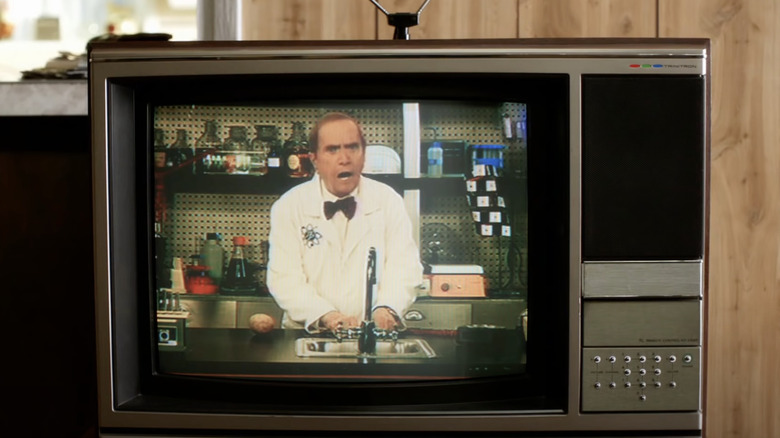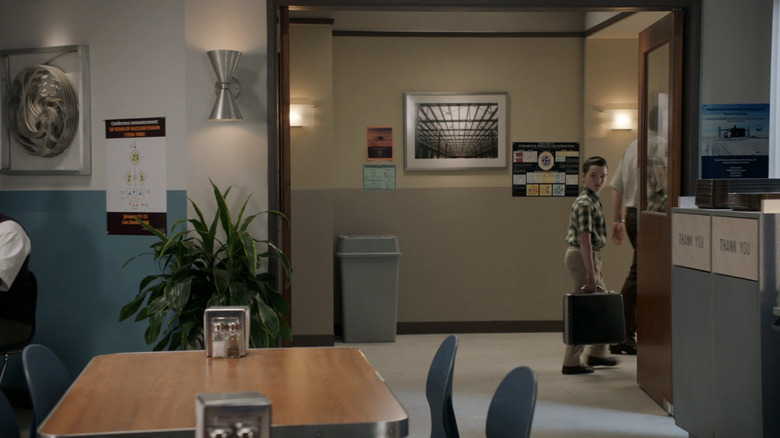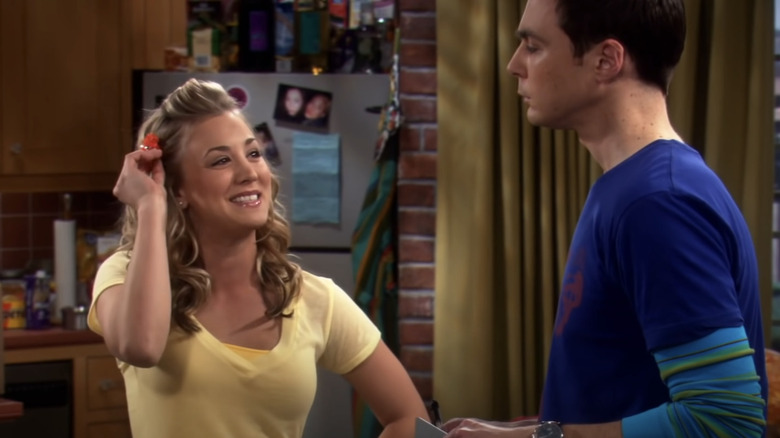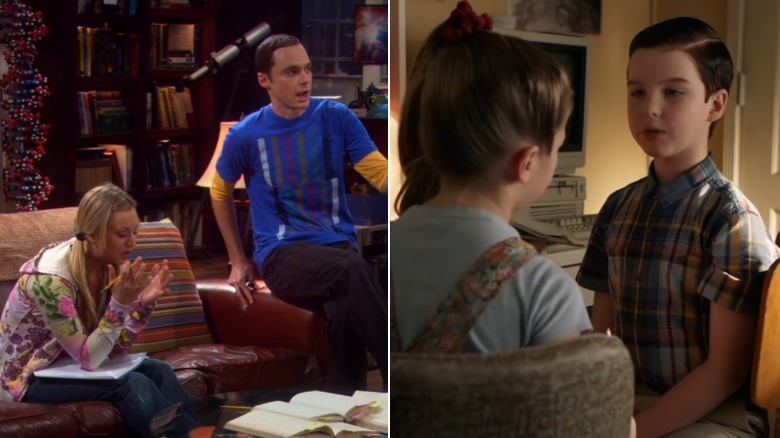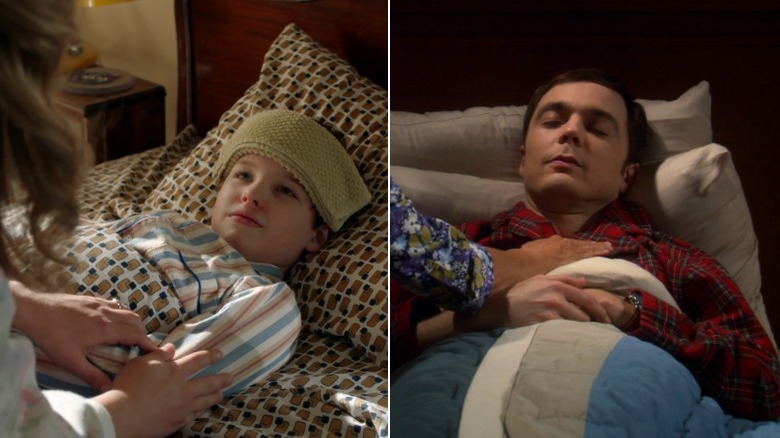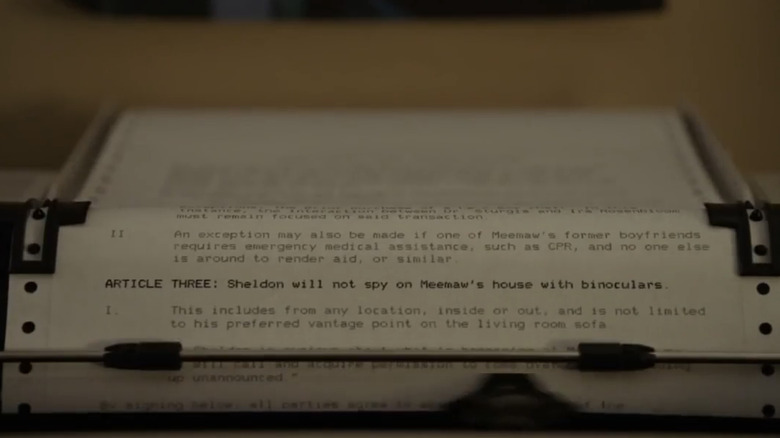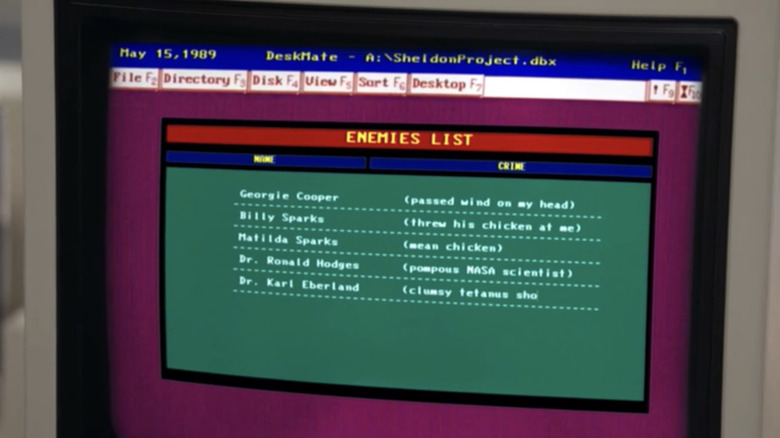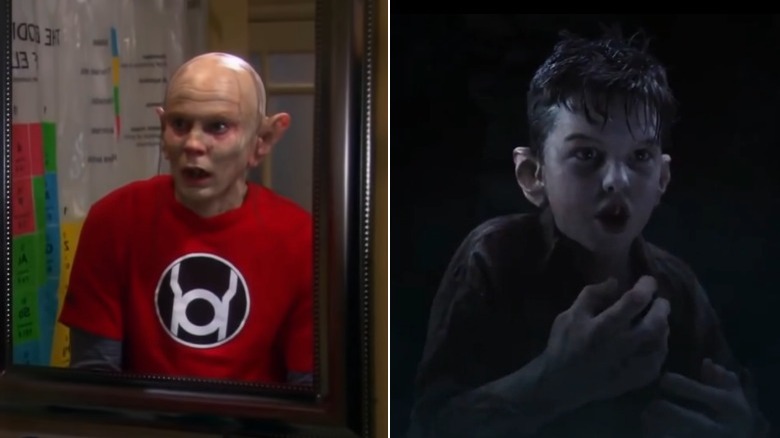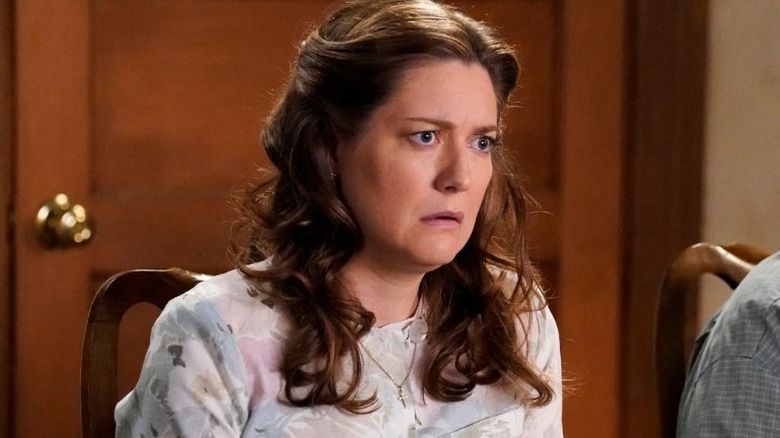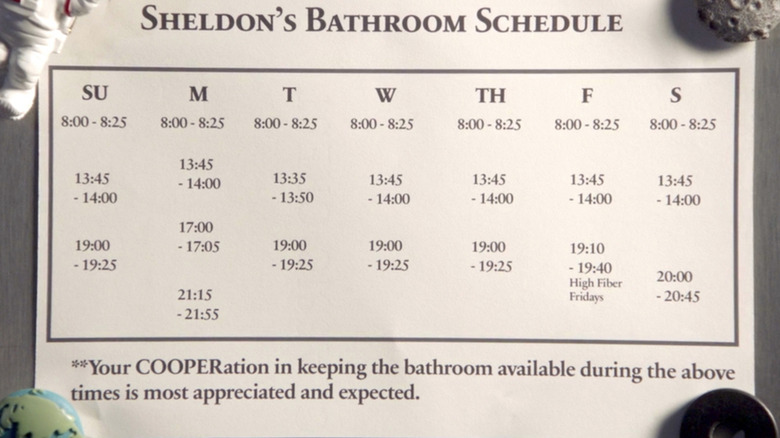11 Best Big Bang Theory References You Missed In Young Sheldon
Sheldon Cooper from "The Big Bang Theory" is a quirky character whose idiosyncrasies have endeared him to audiences for more than a decade. On "The Big Bang Theory," his antics made some wonder what the eccentric Sheldon must have been like as a child and how his mother managed to raise him by herself.
"I'm not crazy, my mother had me tested," is just one tantalizing Sheldon bon mot that seemed to indicate as much humor in the character's past as in his present. his was augmented by frequent mentions of his upbringing in Texas, his now-deceased father, his overly religious mother, and two siblings.
Jim Parson's portrayal of the character garnered him four Emmy Awards, but it made a lot of sense to "Big Bang" loyalists when the prequel/spinoff "Young Sheldon" was devised in 2016 (from an original pitch by Parsons, who serves as an executive producer on the show). Debuting in 2017, the series chronicled the early life of the character (now played by Iain Armitage) in Texas, beginning at age 9 in 1989.
Alongside family members including his mother Mary (Zoe Perry), father George (Lance Barber), brother Georgie (Montana Jordan), twin-sister Missy (Raegan Revord), and his beloved grandmother Connie (Annie Potts), the show is as entertaining as it is heartwarming. Much like the hints of Sheldon's past in "The Big Bang Theory," the prequel has returned the favor, peppering in throwbacks and references to its parent show, often cleverly buried within its narrative. Below are some of the best "Big Bang" references you may have missed in "Young Sheldon."
Mary Cooper's casting runs in the family
While watching Mary Cooper deal with the antics of precocious, 9-year-old Sheldon, first-time viewers of "Sheldon" might wonder how the show's creators managed to cast someone who looks and acts so reminiscent of Laurie Metcalf on "Big Bang." As it turns out, the creators didn't have to look far; Metcalf's daughter, Zoe Perry, filled the role. Fortunately for all involved, Perry's age just happened to align with the timeline of the series, since "Young Sheldon" takes place roughly two decades before the pilot episode of "The Big Bang Theory."
It's rare that actors get the opportunity to share their a role with their parent or child, so both Metcalf and Perry are thrilled with how things worked out.
"I had already planned to have lunch with [Metcalf] and a friend the afternoon I found out," Perry remembered of the day she landed the role in a 2020 interview. "I found out right before meeting with them, and then I got to tell them. We were loud and boisterous in the restaurant for a second and then we calmed down. It's been a cool experience getting to share this with her. She's been so great and supportive along the whole path of this career I've embarked on."
Professor Proton
In "Big Bang" canon, a man named Arthur Jeffries was the host of a children's science show called "Professor Proton," and it inspired Sheldon to pursue a career in science at a young age. But in the ensuing years, Jeffries became downtrodden, with his wife leaving him for the puppeteer on his show; ultimately, he became a reluctant party entertainer.
Introduced in Season 6, Episode 22 of "The Big Bang Theory," Jeffries was played by legendary comedian Bob Newhart; the role earned the comedy veteran an Emmy for outstanding guest actor in a comedy series, and with repeated appearances the "Newhart" and "Bob Newhart Show" legend became a fan favorite.
Although he is now into his nineties, Newhart is still making people smile. Newhart appeared in a blink-and-you'll-miss-it cameo in the pilot episode of "Young Sheldon" via the Professor Proton show, watched by young Sheldon and clearly having an inspiring effect on him.
The Caltech Cafeteria
In the "Young Sheldon" episode "Pasadena" (Season 3, Episode 16), Sheldon begs his father George to take him to Pasadena, California for a lecture conducted by renowned physicist Stephen Hawking, another one of Sheldon's idols, at Caltech institute. The mention of Caltech may perk up the ears of die-hard "Big Bang" fans, as it will become the eventual workplace of the gang (Sheldon, Leonard, Howard, and Raj).
The ending of the episode makes a particularly poignant reference to the original show, as Sheldon and George walk through the hallway of the institute. They end their visit at the cafeteria, where Sheldon says with surety that he "can see [himself] going here one day." Surely enough, Sheldon will go on to graduate from Caltech and work there as a theoretical physicist.
The cafeteria is where the gang would often catch up during lunch, sharing many memorable "Big Bang" moments. Though not always as intellectually stimulating as the young Sheldon may have hoped — the quartet once argued over a prop ring from "The Lord of the Rings" — it nonetheless represents a very special place in the life of Sheldon Cooper.
Kaley Cuoco scares Sheldon again (but not as Penny)
Jim Parsons, Mayim Bialik, and Simon Helberg aren't the only ones from "Big Bang" to have their voices featured on "Young Sheldon." Kaley Cuoco made a voice cameo appearance in a Season 3 episode of the prequel show that might be tricky to spot, since Cuoco isn't voicing her "Big Bang" character Penny and her name doesn't appear in the end credits.
In "Teenager Soup and a Little Ball of Fib" (Season 3 Episode 10 ), Sheldon is faced with having to attend a swim test at his school. Dreading the bacteria that rests in the school's swimming pool, germaphobic Sheldon does everything in his power to avoid it, including faking an illness to avoid going to school altogether. His guilt induces a nightmare where the pool water (voiced by Cuoco) entices Sheldon to come closer by promising that it's clean and hygienic, only to gobble him up, waking a startled Sheldon. Cuoco's presence — and her dynamic with Sheldon — is reminiscent of a running gag in "Big Bang" where Penny would often frighten the neat-freak Sheldon with her messiness.
Sheldon's Gorilla Experiments with Penny and Missy
In the long list of Sheldon's accomplishments — including winning a Nobel Peace Prize in "The Big Bang Theory" series finale — "teaching" is definitely not on that list. But in the "Young Sheldon" episode "A Race of Superhumans and a Letter to Alf" (Season 2 Episode 11) , Sheldon's twin sister Missy asks Sheldon to teach her fractions, which he eventually accepts as an experiment on teaching monkeys (whose level of intelligence he believes Missy is comparable with). This is a nod to the "Big Bang" episode "The Gorilla Experiment" (Season 3, Episode 10) where Sheldon embarked on a similar experiment which he called "Project Gorilla" after Penny (Kaley Cuoco) asked him to teach her "a little physics," and Sheldon compared the notion to "teaching sign language to Koko the Gorilla."
While both of these instances involve Sheldon providing tutorship to dim-witted sister figures, neither end well: Sheldon's experiment with Missy has him trying to command her to do his biddings by cutting her favorite doll, causing Missy to punch him in the face; Sheldon's attempt to tutor Penny brings her to tears.
Soft kitty, warm kitty...
Adding to the plethora of ways "Big Bang" is a lot like "Friends," there's a song that gives Lisa Kudrow's "Smelly Cat" song a run for its money: The similarly-feline-themed "Soft Kitty" lullaby in "The Big Bang Theory."
In "Big Bang," Sheldon would often insist whomever was taking care of him (mostly Penny) to sing the song whenever he would be sick or sleepy, as he claimed his mother did during his childhood. This running gag yielded several memorable moments on the series, like the time Penny asked Sheldon to sing to her when she was injured and under medication, or when Sheldon sang it to a dying Professor Proton in the hospital.
Since Sheldon made repeated mention of his mother Mary singing the song to him throughout his childhood, it makes sense that it appears frequently in "Young Sheldon," making its first appearance in "A Sneeze, Detention, and Sissy Spacek" (Season 1 Episode 13). At the end of the episode, Mary sings "Soft Kitty" to Sheldon on his bed when he has the flu, tying back to a memorable "Big Bang" moment with Sheldon (slightly) more grown up.
Relationship agreements
For the socially-impaired Sheldon Cooper, one way to deal with difficulties in human interactions is drawing up agreements and contracts for all involved (including friendships and romantic relationships), removing ambiguity and clearly defining what each "party" is expected to do in a given situation. One example came in "Big Bang," as Sheldon made a roommate agreement with Leonard containing absurd, obfuscated clauses that drove Leonard crazy. Sheldon would later draft a relationship agreement with his girlfriend/eventual wife Amy, leaning heavily in Sheldon's favor and frustrating his paramour to no end.
The genesis of this tiresome trait is depicted in the "Young Sheldon" episode "Vanilla Ice Cream, Gentleman Callers, and a Dinette Set" (Season 1 Episode 22). When his beloved Meemaw and her boyfriend Dr. Sturgis get into an argument, 9-year-old Sheldon gets the idea to draft a "relationship contract" on his computer that would clearly define the bounds and limitations of their dynamic, including a clause where Sheldon isn't allowed to spy on Meemaw's house with his binoculars.
Enemies List
Keeping mental notes of one's grudges can be both tiresome and draining — especially for Sheldon Cooper, who would prefer to preserve his mental energy for more important pursuits in life such as science, physics, and countless hours of gaming, comic-book reading and rewatching old episodes of "Star Trek." Sheldon's solution? A list of his "mortal enemies," kept on a five-and-a-quarter-inch floppy disk.
Noteworthy individuals unfortunate enough to be included on the list include Wil Wheaton (although he has been removed from the list on two separate occasions) and Joel Schumacher, for "nearly destroying the Batman franchise."
The presence of the floppy disk and a few other clues have always seemed to imply that Sheldon has been maintaining this list since the late 1980s/early 1990s — essentially, his childhood. This was confirmed in the "Young Sheldon" episode "A Computer, a Plastic Pony, and a Case of Beer" (Season 1 Episode 22), which had Sheldon falling in love with a computer he spots at a local Radio Shack, particularly for its ability to "easily alphabetize" his list of enemies and their transgressions. As the title partly suggests, the computer would become a focal point for the episode, with Sheldon unwittingly sparking a heated disagreement between his parents about their finances after asking them to buy him the computer.
Sheldon turns into Gollum... again
One of the most unsettlingly iconic images in "The Big Bang Theory" was that of a Gollumized Sheldon scaring himself in the mirror. Derived from "The Precious Fragmentation" (Season 3 Episode 17) when Sheldon wages a piffling war against Leonard, Raj, and Howard over a prop ring officially used in the production of Peter Jackson's "The Lord of The Rings" adaptations, it was both funny and creepy. After his three opponents copped out, Sheldon found himself as the sole possessor of the ring, and going to the bathroom to clean it, looks up in the mirror to see that his greed has turned him into Gollum. Of course, it's only a nightmare.
"Young Sheldon" revisited the moment in "Hobbitses, Physicses and a Ball With Zip" (Season 3 Episode 4), as Sheldon read up on Tolkien's "Lord of the Rings" books as a way to "take a break from science." Similar to his older self, Sheldon becomes so engrossed with the fantasy world of the series that it invades his dreams — and in a Gollum-like moment of split indecision, he argues with himself. Clearly, Gollum is the best pop-culture character to personify Sheldon's inner demons, both as a child and as an adult.
Mary's smoking habit
In "The Big Bang Theory," Sheldon's mother Mary Cooper is firmly established to be, in Sheldon's words, a "kind, loving, religiously fanatical right-wing Texan with a mild Dr. Pepper addiction." Apart from said addiction, Sheldon additionally revealed in a sleepy stupor (Season 2, Episode 1: "The Bad Fish Paradigm"), that his mother had a secret (and rather nasty) smoking habit during his childhood in. "Mom smokes in the car," he explained. "Jesus is okay with it, but we can't tell Dad."
Sure enough, "Young Sheldon" has Mary secretly reaching for a cigarette whenever she's tense, also depicting a woman who was once a rebellious teen, much like Georgie is now. The first instance of Mary smoking was shown in "A Secret Letter and a Lowly Disc of Processed Meat" (Season 3 Episode 21), brought on when Mary got distressed by the possibility of 11-year-old Sheldon leaving the nest after getting an offer letter from CalTech. Then, in "A Lock-In, a Weather Girl and a Disgusting Habit" (Season 5, Episode 11), as marital problems threaten George and Mary, George comes home to patch things up with his wife, only to find her bonding with Pastor Rob over a smoke.
Sheldon's bathroom schedule
Sheldon's strict adherence to a bathroom schedule, and its inclusion in his roommate agreement with Leonard, reliably caused irritation throughout "Big Bang." The printed timetable hung on the refrigerator in Sheldon and Leonard's apartment, becoming a bone of contention between Sheldon and Leonard's then-girlfriend Priya in "The Agreement Dissection" (Season 4 Episode 21) when the LLB graduate acted as Leonard's lawyer, nullifying several clauses in the roommate agreement, including the bathroom schedule.
But now, it has been revealed that Leonard wasn't the only one to bear the brunt of Sheldon's excremental timetable: In the "Young Sheldon" installment "Cape Canaveral, Schrödinger's Cat, and Cyndi Lauper's Hair" (Season 1 Episode 8), Mary details Sheldon's bathroom schedule to George when the latter takes nine-year-old Sheldon on a trip to Cape Canaveral.
The schedule also received a shout-out in "Pasadena" (Season 3 Episode 16) when George, once again taking his son on a cross-country trip, shudders at the thought of having to deal with the boy's bathroom schedule in a different time zone. The infamous timetable then appeared in the flesh in "A Suitcase Full of Cash and a Yellow Clown Car" (Season 5 Episode 16), its image laid over adult Sheldon's narration for fans to screengrab and, perhaps, use as inspiration to make their own at home.
